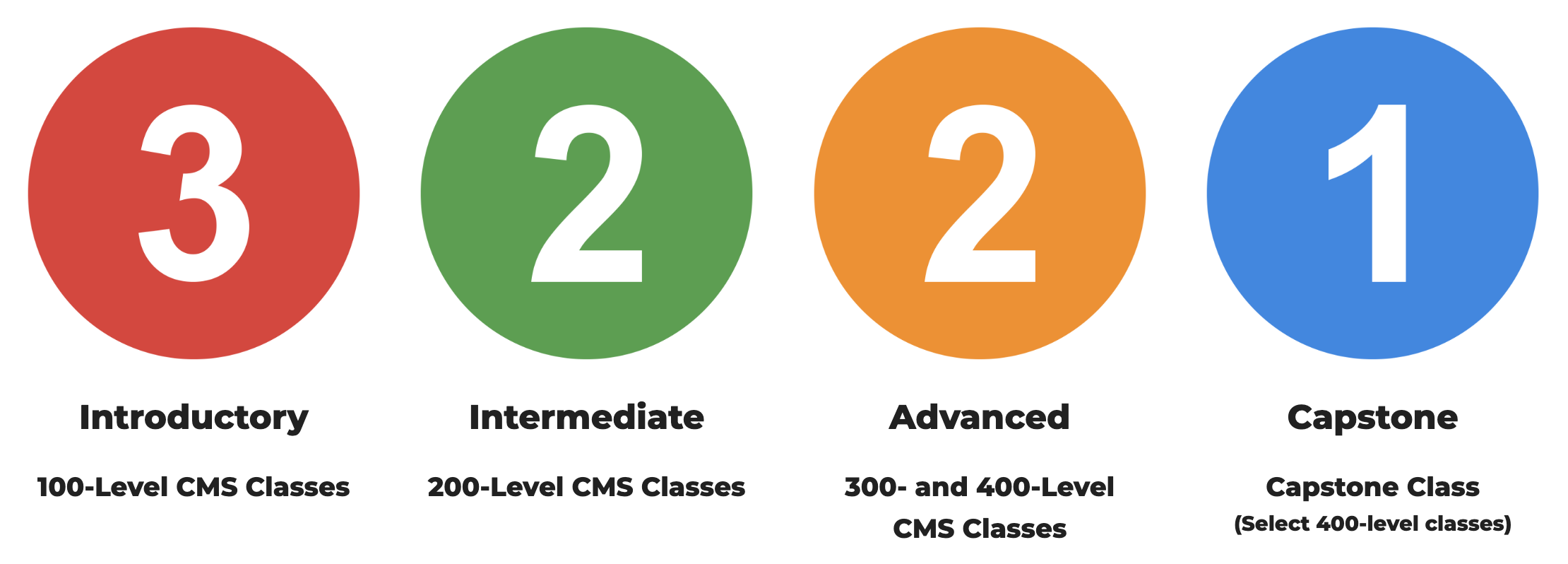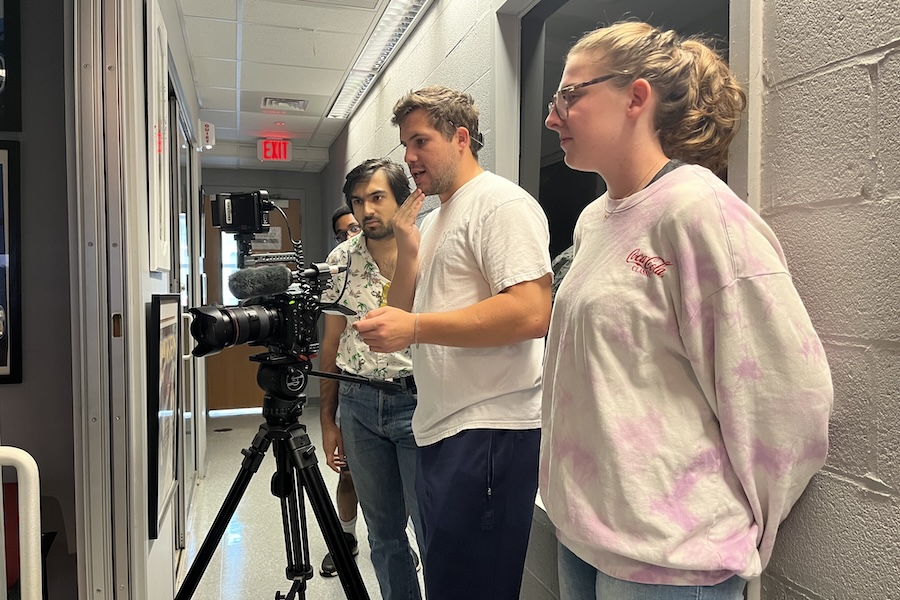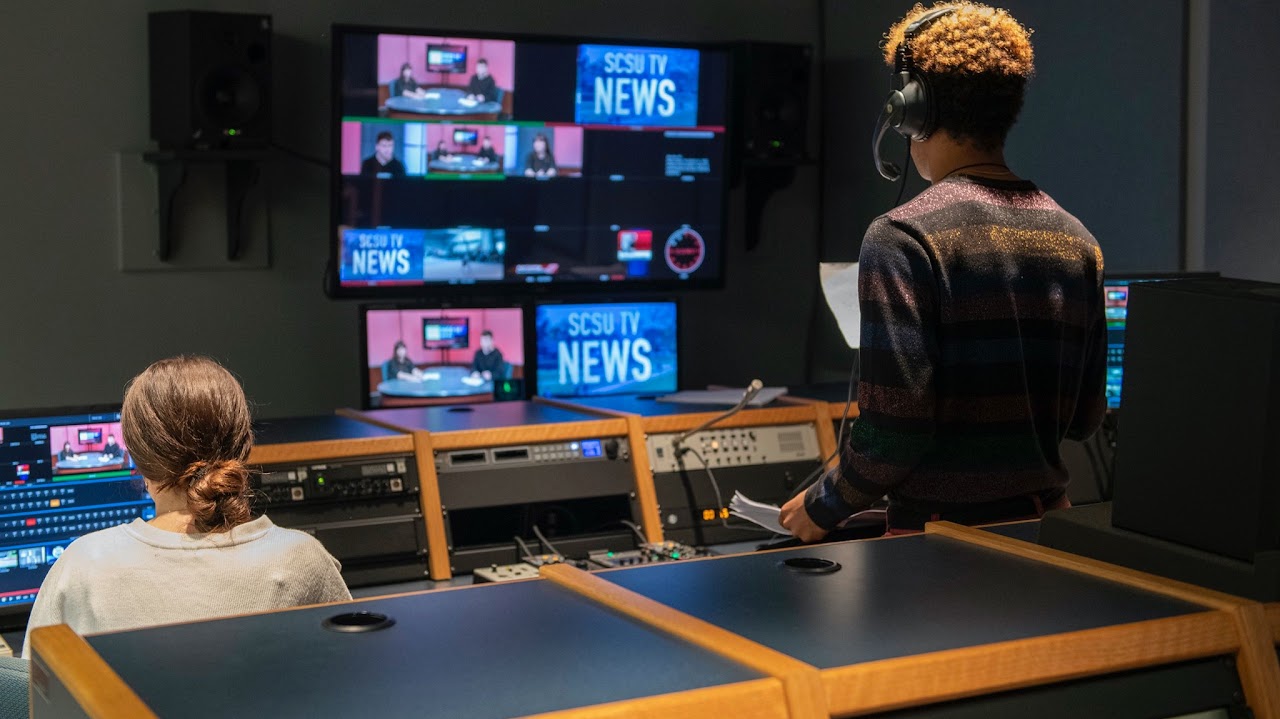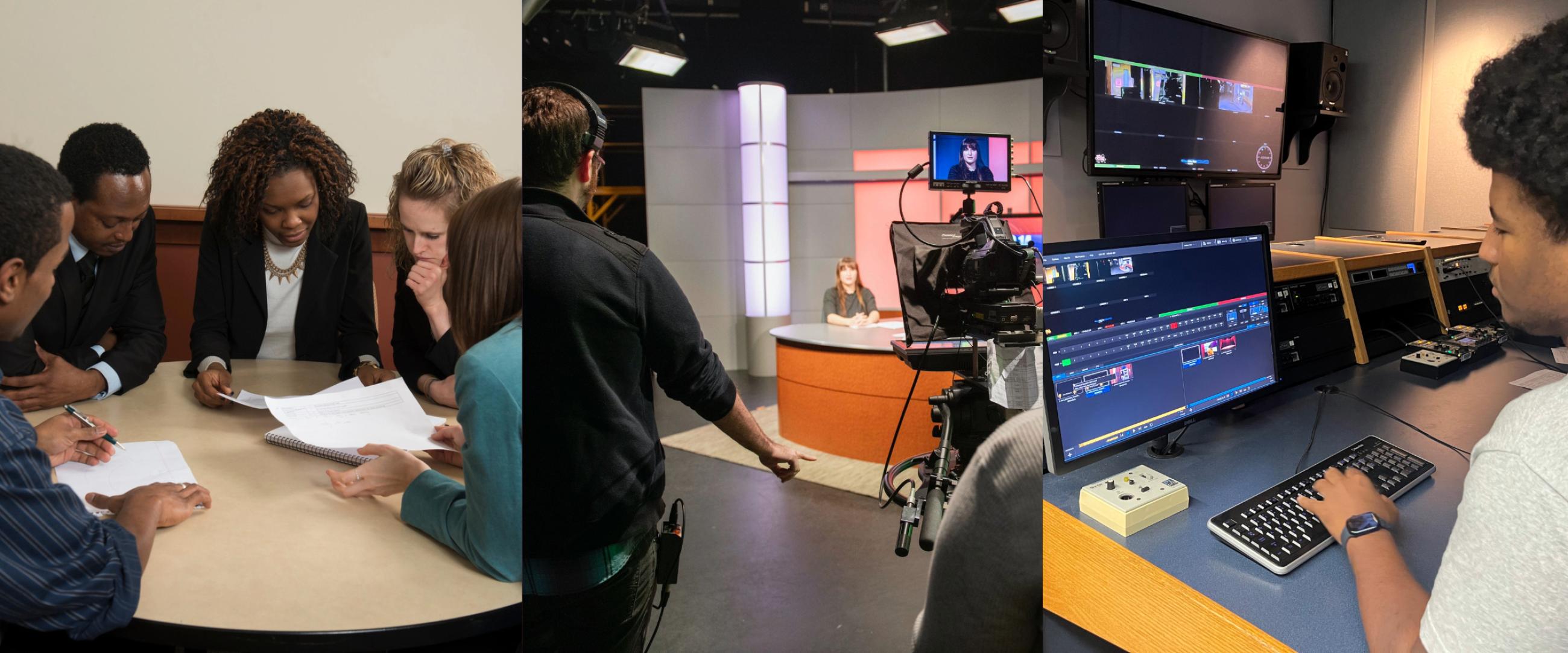Our Communication, Media, and Screen Studies (CMS) degree offers students a broad range of study and skillsets, including advertising and public relations, persuasion and propaganda, film and cinema studies, gender and identity issues, filmmaking, television and digital production, media literacy, social media, online content creation, interpersonal relationships, strategic communication, and leadership.
The wide spectrum of knowledge students gain in our program, opens limitless opportunities for careers, whether it’s in the boardroom or in the field, making, curating, or critiquing mediated communication, working in front of a camera, or preparing for graduate studies. Through our dynamic and exciting array of courses, students in our program tailor their learning experiences to their passions and career goals. Whether you choose our broadly defined CMS area of study or the Film, Television, and Media Production (FTMP) concentration, our program offers a compelling blend of theory and practice that cultivates versatile skills and insights to navigate today's rapidly evolving communication landscape.
Program Features
Simplified Requirements and Pre-requisites
The structure of the CMS major prioritizes flexibility and open choices for courses. Course requirements reflect this through levels of knowledge for the major, with a minimum number of courses at each level. This makes the course requirements easy to remember, there's 3 courses at the Introductory level (100-level courses), 2 courses at the Intermediate level (200-level courses), 2 courses at the Advanced level (300- and 400-level courses), and 1 course at the Capstone level (select 400-level courses). With 3-2-2-1, keeping track of the basic program requirements is easy. The remaining 21 credits (7 classes) for the major can be taken at any level.

Rather than having long strings of pre-requisite courses, taking a class at one level unlocks courses at the next level. This makes it easy to move on to more advanced topics within the major. For example, completing a 100-level class (Introductory level) will unlock the 200-level courses (Intermediate level).
Hands-on and Experiential Learning
The CMS program integrates real-world experience in classes whenever possible. Extending beyond traditional lectures, our classes are enriched by active learning strategies, as well as incorporating game-based learning, simulations, and work with actual clients in practicum experiences.
Practicums and Internships
Students have the option of pursuing one or more internships as part of their studies, which is a great way to supplement the practical learning offered throughout our curriculum. Our internship coordinator is a full-time faculty member who works with students to identify internships that will complement interests in the program.
Concentrations
Communication, Media, and Screen Studies, B.A. - Communication, Media, and Screen Studies
The Communication, Media, and Screen Studies concentration is designed to provide students with a deep understanding of the integral and influential role of communication and media in society and our daily lives. Students will develop theoretical knowledge and practical experience in the areas of interpersonal communication, advertising and promotion, organizational communication, and media literacy.
Communication, Media, and Screen Studies, B.A. - Film, Television, and Media Production
Geared toward aspiring filmmakers and content creators, students develop their understanding of professional theory and techniques that prepare them for careers in all aspects of the media production industry. Aspiring filmmakers and content creators develop their understanding of professional theory and techniques that prepare them for careers in all aspects of the media production industry.
Interest Pathways
An interest pathway is like a checklist of courses that can help you learn more about a topic or career you're interested in. They basically give you a roadmap of all the classes you might need to take to graduate and achieve your goals. These pathways usually include a mix of required and optional classes that focus on specific skills and knowledge for a certain field of study.
Differences Between a Concentration and an Interest Pathway
Concentration
A concentration typically refers to a specialized area of study within a degree program. Within the Communication, Media, and Screen Studies undergraduate program, concentrations include "Communication, Media, and Screen Studies" and "Film, Television, and Media Production." Students choose a concentration to focus their studies on a particular aspect of the broader program, with each concentration including a definitive list of class requirements.
Interest Pathway
An interest pathway is a suggested sequence of courses related to inquiry about a topic or a career goal. Pathways are designed to guide students through their academic journey by providing a clear roadmap of potential courses they might take to fulfill their degree requirements and achieve their academic and career goals. Pathways often include a combination of required and elective courses aimed at developing specific skills and knowledge in a particular area of study.

Internship and Experiential Learning Opportunities
Students will gain valuable experience by applying practical and theoretical skills outside of the classroom through a variety of experiential learning opportunities, including:
- Internships: Students can directly obtain knowledge, skills, and competencies within a large network of professional organizations. Our internship experience also includes on-campus seminars focused on improving your interviewing, networking, and resume-writing skills.
- Independent Study: Students have the opportunity to develop new knowledge and scholarly inquiries within a topical area of their choice under the guidance and supervision of department faculty members.
- Practicum Courses: Practicum courses within each concentration will allow students to utilize their communication skills in real-world, professional simulations.
- Study Abroad: SCSU students have the opportunity to further expand their study of Communication with over 30 distinguished institutions from all over the world.
- Student Research / Creative Activity: Students have the opportunity to work collaboratively with current faculty on an extensive project within their area of expertise.
- Service Learning: SCSU students have the opportunity to apply their communication skills while serving the Greater New Haven community.
Learning Outcomes
The learning outcomes for the CMS program align with the three key areas of knowledge and skill acquisition.
Communication
Focus on the ways human interaction influences and maintains identity and power structures. Students will be able to:
- Develop a deep understanding of communication theories and concepts related to identity, interpersonal dynamics, and organizational communication structures.
- Analyze and critically evaluate the role of communication in shaping and maintaining identity and power structures within organizations and society.
- Apply communication theories and concepts to real-world scenarios through effective verbal, written, and digital communication.
Media
Focus is on critical and creative thinking about the role of media in society and the ways it can be used as a means of extending understanding, cultivating creative expression, and fostering social change. Students will be able to:
- Apply critical thinking and creative problem solving to original communication and media production and analysis projects.
- Evaluate the cultural and social contexts in which the messages are presented, and the impact of these messages on the target audience and broader culture.
- Analyze and create advertising and public relations messages across multiple media platforms.
- Design messages that align with a project’s goals, audience, and ethical considerations.
- Collaborate and communicate effectively with team members and stakeholders relative to production and analysis projects.
- Demonstrate the ability to articulate ideas, give and receive constructive feedback, and adapt to changing needs and requirements.
Screen Studies
Focus is on the history and media institutions, theories, practices, and emerging trends of screen-based media. Students will be able to:
- Understand the historical development of screen media and its cultural, social, and technological impact on society.
- Analyze screen media in terms of form, genre, style, representation, and audience reception.
- Evaluate the role of screen media in shaping and reflecting cultural values, beliefs, and attitudes.
- Engage in interdisciplinary thinking, exploring the relationships between screen media, technology, culture, and society.
- Inspire students to use screen media as a means of expression and to promote positive social change.
Careers
Graduates often find themselves working in areas such as journalism, public relations, marketing, social media management, content creation, digital advertising, television and film production, and more. Media and communication jobs are expected to grow by 4% by 2028 U.S. Bureau of Labor Statistics.
Typical Job Titles
- Digital Marketing Specialist
- Film / Video Editor
- Marketing Coordinator
- Media Planner
- Public Relations Specialist
- Social Media Manager
- Television Writer
- Video Producer
- Web Content Manager
Digital Production Facility
The CMS Digital Production Facility (DPF) is an advanced media production hub designed to equip Film, Television, and Media Production students with the tools and expertise necessary for mastering their craft. Featuring state-of-the-art technology, the DPF offers a fully functional television broadcast studio, editing suites, a live-streaming podcast studio, and access to high-end field equipment.
Learn more about the Digital Production Facility

School / College
College of Arts & Sciences
Department
Communication, Media, and Screen Studies
Contact
Dr. David Petroski

